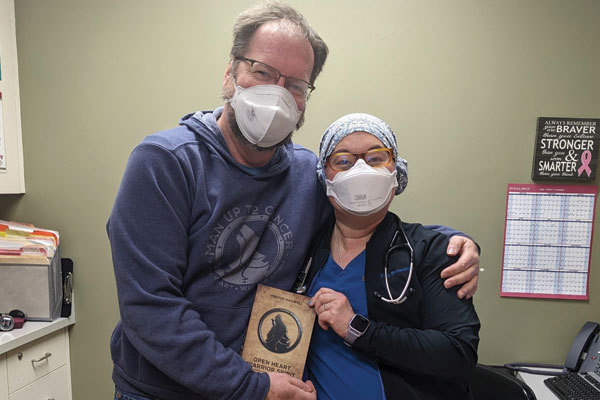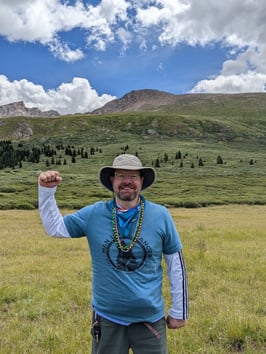Facing Cancer Like an Engineer: A Problem in Search of Solutions
5 min read

One Sunday afternoon in March 2021, Brandon Martin, 61, was hanging out in his Thornton apartment when he doubled over with pain.
“All of a sudden I had a searing, intense pain in my abdomen,” Brandon said. “Then I collapsed.”
Brandon knew something was terribly wrong, as he passed in and out of consciousness.
“A little part of my brain told me, ‘Okay, something really, really bad has happened. You better call 911,’” he said, “and I eventually managed to do so.”
After an ambulance trip to the hospital, doctors discovered that Brandon’s colon had ruptured from diverticulitis, a digestive disorder that affects the colon. Brandon needed emergency surgery, including an ostomy – a procedure that creates an opening (stoma) for waste collected in a removable pouch.
“I woke up with an ostomy pouch, and that was the beginning of my introduction to the medical world,” he said.
Unfortunately, Brandon’s medical odyssey was only beginning. Patients with complicated diverticulitis have a higher risk of colorectal cancer. Two months after his surgery, his physician recommended a colonoscopy.
“They wanted to see how my colon was healing from the surgery, so they could possibly resection my colon to reverse the ostomy,” Brandon said. “It was during that colonoscopy that they found a stage 3 tumor growing in my rectum.”
Managing an Unexpected Diagnosis
Before his colon ruptured, Brandon had experienced blood in his stools.
“I wasn’t experiencing pain, but I was experiencing bloody discharge,” Brandon said. “You know, I’m a guy, and I just blew it off. But now that I know what I know, blood in your stool is a really bad sign, and you need to get that checked immediately.”
Fresh rectal bleeding and dried blood in the stool that looks black are two of the most common symptoms of colon cancer. Brandon took the disappointing news with a somewhat philosophical frame of mind.
“I’m an engineer, so I don’t really attach a lot of emotions to the whole thing,” Brandon said. “It’s like my brain just says, ‘Okay, here’s a problem, and now we have to figure out how to solve it.’”
Brandon’s surgeon recommended he contact Rocky Mountain Cancer Centers (RMCC), where Dr. Eiko Browning, medical oncologist and hematologist at RMCC, suggested Brandon begin chemotherapy and radiation immediately.
“I started oral chemotherapy and began radiation five days a week for five weeks,” Brandon said. “After radiation was over, I began IV chemotherapy, which lasted until December.”
After a month-long break over the holidays to get his platelet counts up, Brandon had surgery to remove the tumor in January 2022.
“Oddly enough for me, I had no side effects from any of the chemotherapy,” he said. “I had some topical skin scarring from radiation, but otherwise I felt physically normal. After the surgery, we thought we had gotten all the cancer out before it could spread.”
Back to Normal – Briefly
 After he recovered from the surgery, Brandon resumed his part-time teaching job at Front Range Community College, instructing classes in 3D CAD (computer-assisted design) modeling software for mechanical engineering students and blueprint reading for machinists. At the end of the semester in May, he received the news: A blood test that detects potential recurrence early showed signs of circulating cancer DNA. Follow-up imaging confirmed that Brandon’s cancer had metastasized and was now stage 4.
After he recovered from the surgery, Brandon resumed his part-time teaching job at Front Range Community College, instructing classes in 3D CAD (computer-assisted design) modeling software for mechanical engineering students and blueprint reading for machinists. At the end of the semester in May, he received the news: A blood test that detects potential recurrence early showed signs of circulating cancer DNA. Follow-up imaging confirmed that Brandon’s cancer had metastasized and was now stage 4.
“There were multiple tumors on my lungs and one on my liver – not just one tumor that was treatable – and that’s when I knew my approach had to change,” Brandon said. “I had looked at the past year as a project, a task to get done, a spreadsheet. With metastatic cancer, I realized the project went beyond the scope of my being able to do it on my own. That’s when I began looking for support groups.”
Finding Support from Other Men
It turned out Brandon did have some emotions to process, and he was ready now. In June 2022, he discovered an online support group called Man Up to Cancer, founded by another man diagnosed with colorectal cancer for any man facing any type of cancer.
“There’s a private Facebook page where we can talk about treatments and side effects and relationship issues – the whole gamut of living with cancer,” Brandon said. “It’s a safe space for us to share our feelings. No one has to face cancer alone. There are plenty of resources available for help and support.”
Through the online group, Brandon connected with other men in the greater Denver area going through similar experiences.
“One of those guys has become my best friend, and we chat every day, all day long,” he said. “Now every morning I’m chatting with six or eight guys, checking in, and that’s my community.”
Brandon even traveled last fall to upstate New York to a national event sponsored by the group, where he was able to bond with dozens of other survivors.
“Cancer diagnoses and treatments can destroy relationships,” Brandon said. “But with the support of this group, I’ve gone from being anxious and afraid to building a new community, with new lines of communication.”
Facing the Future, Staying Positive
Brandon knows his long-term prognosis isn’t great. After months of ongoing chemotherapy, his scans looked good. Then at the end of December, another test showed possible signs of more spread.
“It is what it is – it’s just life, you know?” Brandon said. “I’m 61 years old, and this is what my life is. But also, I could walk into the grocery store today and not walk out again for all I know. So, I don’t let myself get wrapped up in it.”
Despite everything Brandon has been through he continues to find solace in the care he receives at RMCC.
“Every single medical professional I’ve met at Rocky Mountain Cancer Centers has been outstanding,” Brandon said. “I couldn’t even imagine asking for anything better than what I’ve experienced throughout this process. You can just see the love RMCC staff has for patients in everything they do.”
Brandon continues to experience minimal side effects from chemotherapy, which he knows has helped him maintain his positive attitude.
“I’ve been so lucky that I haven’t had to deal with the gastrointestinal and other problems that can cause your quality of life to decline dramatically,” Brandon said. “Since I haven’t had those physical issues, that’s why I’m doing what I am, because I have the strength and I have the will to share my story and be involved.”
One of Brandon’s initiatives is to provide support and education for patients with new ostomies. He believes it’s a big help and comfort to have someone who’s already living with a stoma teach beginners how to live with theirs. Brandon’s goal is to create a transition program to work with patients about how to manage a stoma after leaving the hospital, along with raising awareness about colorectal cancer.
“There is no support when you leave the hospital to take care of your stoma, I had to learn how to do it all myself,” Brandon said.
He decided to contact the nurse who instructed him how to use his ostomy bag and tell her he wanted to connect with patients.
“I’ve met with one man so far,” Brandon said. “I know the odds aren’t in my favor, but while I still have the energy, I’m just going to keep pushing awareness and providing support for other people struggling with this disease.”
If you or a loved one has been diagnosed with colorectal cancer, learn how Rocky Mountain Cancer Centers can help.


